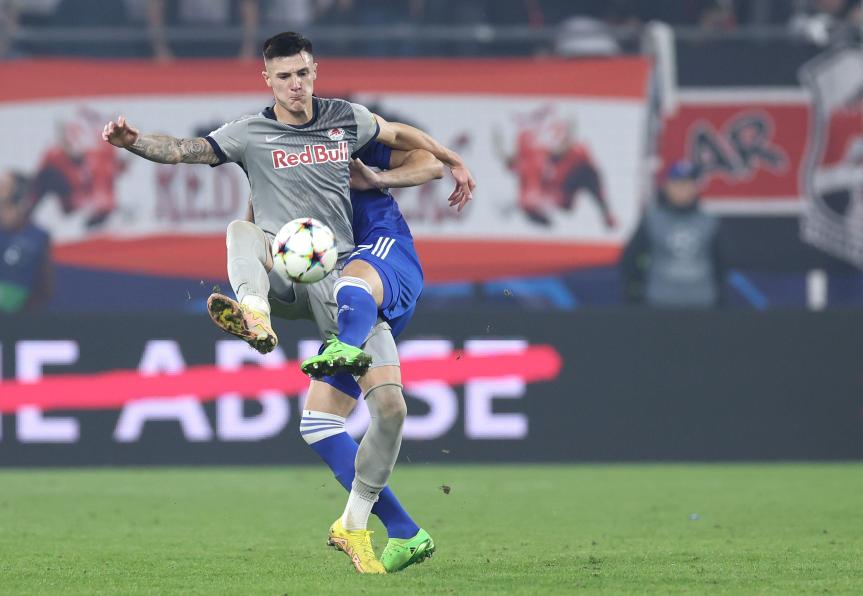WITH ONE game to go in the regular Austrian Bundesliga programme, four of the six places have been decided for the Championship play-off stage. Three clubs are vying for the last two spots: Austria Klagenfurt, Austria Wien and WSG Tirol. At the top of the table, Red Bull Salzburg have cemented their customary seat at the table and sit nine points clear of Sturm Graz, the only Austrian team to beat the champions this season.
Salzburg have won 17 of their 21 games and have lost just once, a 2-1 defeat in Graz. Similarly, they were beaten by Graz in the quarter-finals of the Austrian Cup. Graz face LASK in the semi-final on April 5, the other semi is between Rapid Wien and SV Ried. So, for only the second time in the past 10 years, Red Bull Salzburg will not be winning the double in Austria.
Salzburg’s hold on Austrian football shows little sign of abating, although the gap between the top two as they reach the end of the first stage is less than last season. Salzburg had a substantial margin to take into the Championship round in 2021-22, but the gap may be as little as five points this season. In the past three years, Salzburg’s title winning margin has ranged from 12 to 15 points. As in 2022, their nearest challengers should be Sturm Graz.
The crowds in Austria are at a 10-year high, the average in the Bundesliga is currently 7,226 compared to 5,052 in the regular season in 2021-22. Rapid are the biggest attraction with attendances of 18,300 while Sturm (12,500), Salzburg (11,500) and Austria Wien (10,800) are also in five figures. The Wien derby takes place on March 19, the last game for both clubs in the initial programme, which will mean another healthy gate.
Salzburg, as ever, have some bright young players who are attracting the attention of clubs in Germany and England. Slovenian Benjamin Šeško is just 19 but his performances have already marked him as a star of the future. The statistics underline the impact he has made – a goal involvement every 89 minutes and 0.76 goals per 90 minutes. He also has a remarkable physical presence. Another youngster, the 20 year-old Croatian Luka Sučić, is being touted as “the new Modric”, such is the impression he has made so far. And then there’s 18 year-old Dijon Kameri, who was nurtured from within the club’s youth system, a midfielder of enormous promise according to Salzburg watchers.
RB Salzburg’s so-called “player factory” not only ranks among the top three sources for “big five” league clubs, but also ensures that the club itself has the youngest average age (22.4 years) among Austrian Bundesliga clubs. They also have the highest percentage of foreign players (63.7%) in their squad. Salzburg have developed a strategy for recruiting youngsters in the mid-to-late teens and then selling them for handsome profits. Others are following this approach, but Salzburg’s big advantage is their ownership and the multi-club model in which they operate.
Austrian teams failed to make much progress in Europe this season. Salzburg were third in their Champions League group behind Chelsea and AC Milan and then lost to Roma in the Europa League. Sturm Graz were knocked out of the Champions League before the group phase and in the Europa League finished fourth in their group. Austria Wien were thrashed by Fenerbahce in the Europa play-off round and were bottom of their Conference group. Rapid Wien were beaten by Liechtenstein’s Vaduz of all people in the Conference play-offs.
Not many people would bet against Salzburg winning their 10th consecutive title this season. They have the resources and the strategy to ensure their squad keeps churning-out talented young players. Their transfer spend over the past 10 years has totalled € 167 million and their net market activity is a positive of € 373 million, which dwarfs the rest of the Bundesliga and is bettered only by Benfica, Ajax and Porto in Europe. This might not make them especially popular in their home market and doesn’t speak well for the overall competiveness of Austrian domestic football, but nobody can deny that they have created a model that is very effective.

